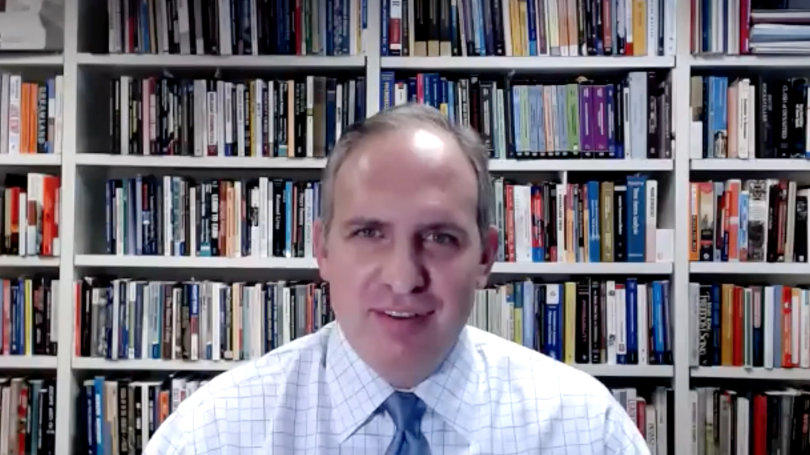
- Public Policy
- Leadership
- Funding
- News & Events
- About the Center
Back to Top Nav
Back to Top Nav
Back to Top Nav
Back to Top Nav
On September 16, 2020, in a discussion titled “Rocky in the 2020s,” Professor Jason Barabas ’93, the newest Director of the Rockefeller Center, welcomed students, faculty, staff, and community members to the new academic year with an overview of the Rockefeller Center’s past, present, and future. Introduced by his predecessor, Professor Andrew Samwick, Professor Barabas outlined the Rockefeller Center’s founding, history, current mission, and programming, followed by a description of the Center’s plans for the coming year and a question and answer session with audience members.
Barabas began with a history of the Rockefeller Center, highlighting the work and the legacy of namesake Nelson A. Rockefeller as critical to inspiring the Center’s current mission and goals. A member of the Class of 1930, Rockefeller spent his life dedicated to policy issues ranging from eliminating housing discrimination to foreign policy as an appointee in several government agencies and as Governor of New York, eventually serving as Vice President under President Gerald Ford. Dedicated in 1983 after Rockefeller’s death, the Center has actively sought to embrace the ideals of public policy leadership and education that Rockefeller himself espoused during his time as a public servant at the local, state, and national level. Barabas also noted that Rockefeller’s deep immersion in the policy process, stemming from his passion for his work, left him popular on all ends of the political spectrum. “There are many problems that we face today,” said Barabas, “that would benefit from leaders that can find the middle.”
A graduate of the Class of ’93 himself, Barabas spent several years as an economic policy advisor for the Governor of Illinois, a postdoctoral fellow at Harvard and Princeton, and a faculty member at universities in New York, Florida, and Illinois, most recently serving as the Director of the Master of Arts in Public Policy program at Stony Brook University before returning to Dartmouth. Noting that it was his own Rocky-funded internship in the White House Office of Media Affairs that became a catalyst for his honors thesis in the Government department, Barabas highlighted the importance of the Rockefeller Center’s curricular and co-curricular programming as a means for students to explore and help attain their academic and professional goals in the public policy sphere.
Crediting Deputy Directors Ron Shaiko and Sadhana Hall and former Director Samwick with the plethora of well-received courses and programs developed over the past fifteen years, Barabas hopes to continue with and expand upon these programs into the 2020s. Noting past and upcoming collaborations with the Hopkins Center for the Arts and the Dickey Center, Barabas highlighted the potential for Rocky to connect with groups such as the Dartmouth Outing Club, The Arthur L. Irving Institute, and global health programming on campus to expand discussions on leadership and policy into a variety of specialized settings. Additionally, Barabas noted, now more than ever, the importance of ensuring that Rocky’s traditional programming remained accessible to all students, especially as they take classes online and tune into campus life from all over the world. In the words of Rockefeller himself, Barabas closed with the following: “It is essential that we enable young people to see themselves as participants in one of the most exciting eras in history and to have a sense of purpose in relation to it.”
-Written by Shawdi Mehrvarzan ’22, Rockefeller Center Student Program Assistant for Public Programs
Learn more about future Rocky Watch events and find links to past events here.
To join our email mailing list for future events, email rockefeller.center@dartmouth.edu